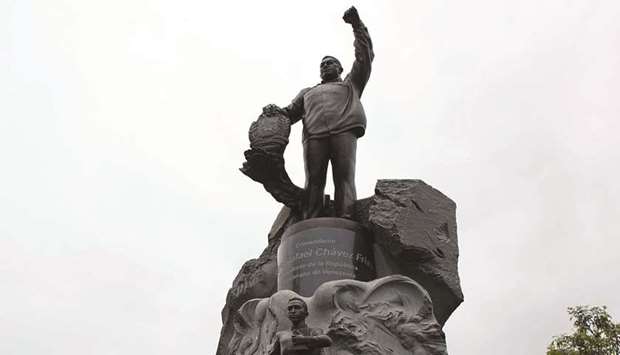In the dozy agricultural town of Hugo Chavez’s birth, soldiers guard an immense statue of the former Venezuelan leader while nearby opposition activists dream of pulling it down.
The Russian-donated sculpture of a fist-clenched Chavez, in a square of Sabaneta near where he was born in a mud hut, has withstood nearly three months of anti-government unrest that has convulsed Venezuela since April and killed more than 70 people.
“It will fall one day soon, you’ll see,” said activist Angel Dorante, noting the vandalism and destruction of Chavez statues and symbols elsewhere in Venezuela.
Surrounded by fertile plains and home to nearly 40,000 people, Sabaneta is a politically sacred spot for the ruling “Chavismo” movement, now led by President Nicolas Maduro, but it has not been immune to protests roiling the nation in demand of elections to end socialist rule.
Locals have been banging pots and pans at night and took to the streets recently during a power cut.
They were dispersed by security forces with teargas, witnesses said.
In the tatty state capital Barinas, where Chavez studied and lived as a youth, the trouble has been far worse.
Many people have turned on the ruling Socialist Party in a poor region that was once their heartland of support.
Even though much of the attention has been on the capital Caracas, Barinas has seen the worst of the anti-government unrest.
Violence on May 22-23 left seven people dead, hundreds of shops looted and the city’s half million people traumatised.
In scenes unthinkable during Chavez’s 14-year rule, the rioters in Barinas stormed and burned the headquarters of the ruling Socialist Party, stoned a house where the late leader had lived as a youth, and defaced images of him on the streets.
A few weeks later, soldiers watch over gas stations, courts and other key buildings while many businesses remain closed with signs saying “already looted” and workers repaint the ransacked party building.
There are still sporadic protests and fear is pervasive.
The anger in Barinas, as elsewhere around Venezuela, is fuelled by widespread hunger and shortages after four years of brutal recession.
There is special bitterness in Chavez’s home state that locals say should be a prosperous bread basket for the nation due to its fertile farming conditions.
“We do not have enough food for our baby. That is why my husband went out to protest, like any other Venezuelan,” said Arianna Espinoza, 20, whose husband, Yorman Bervecia, 19, took to the streets on May 22 near a National Guard military base.
He never came home, shot dead in the chest.
“Now it’s me who wants to go out there and protest,” Espinoza said as she cradled year-old Lucas in her arms.
As well as elections, the protesters are demanding solutions to the crisis-hit economy, an end to rampant corruption, freedom for jailed activists, foreign humanitarian aid, and autonomy for the National Assembly legislature won by the opposition in 2015.
Barinas’ turn away from “Chavismo” dates from that election, when voters elected five opposition lawmakers for six seats.
Maduro calls his opponents “terrorists” bent on a violent coup and is resisting calls to bring forward the next presidential election scheduled for 2018.
He is setting up instead a super-body known as a constituent assembly with powers to rewrite the constitution and override other institutions.
An election for that assembly is set for July 30 but the opposition says it is rigged to guarantee him a majority so they are boycotting the process.
“The terrorist right-wing won’t stop in their attempts to bring down President Maduro’s government,” said Barinas state Governor Argenis Chavez, brother of the late president.
Despite Venezuela’s economic decline and anti-government unrest from the Andes to the Amazon, Maduro retains a hardcore of support and his approval rating of just above 20% is respectable compared to some peers around Latin America.
That reflects the deep reverence among Venezuela’s poor for Chavez, who picked Maduro as his successor and urged people to back him, lingering suspicion of opposition leaders long viewed as an out-of-touch elite, and disgust at violence in protests.
Denny Frias, 43, a distant relative of Chavez who tends the gardens round his statue in Sabaneta, said he was still “100% Chavista” and had the government to thank for both his job and state-provided house.
“Chavez gave his life for his country and Maduro is continuing his work so I support him,” Frias said, wearing a red T-shirt with Chavez’s image in the shadow of the statue. “The troublemakers have tried to come here. They’re paid and given food to be violent. But they can’t touch this statue. We are here watching and we won’t let them.”

A statue of Chavez is seen in Sabaneta.
